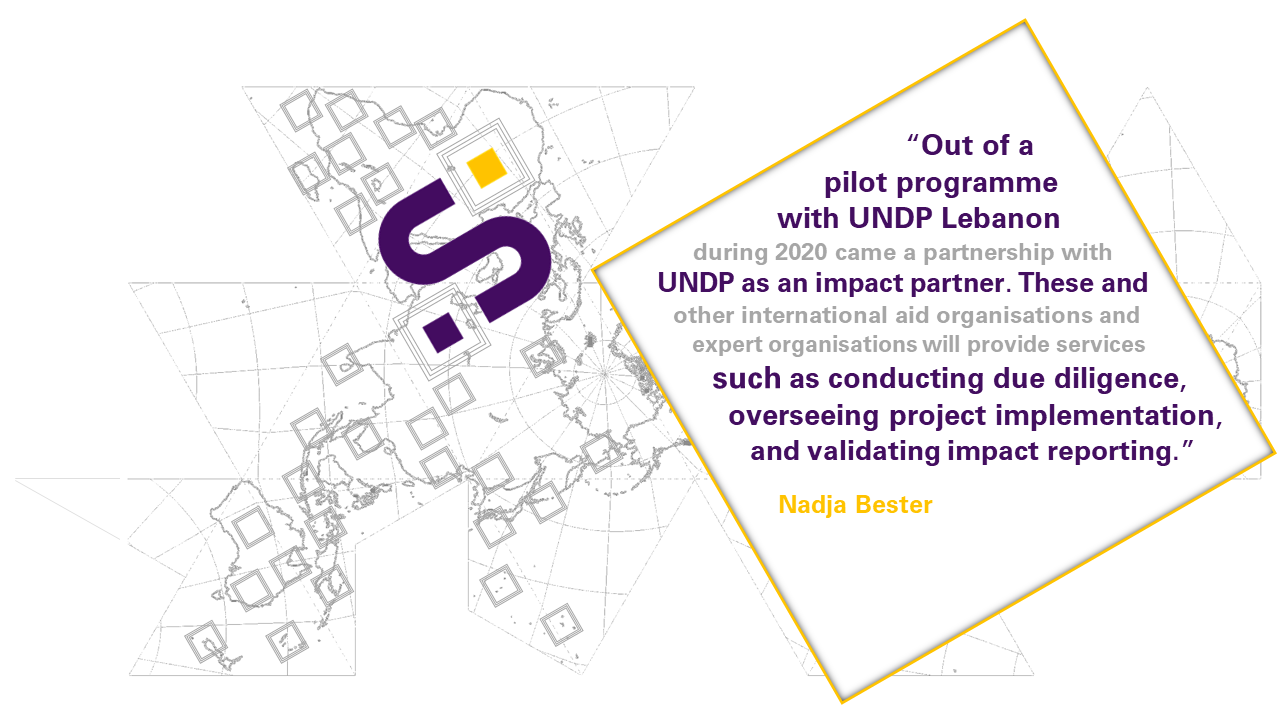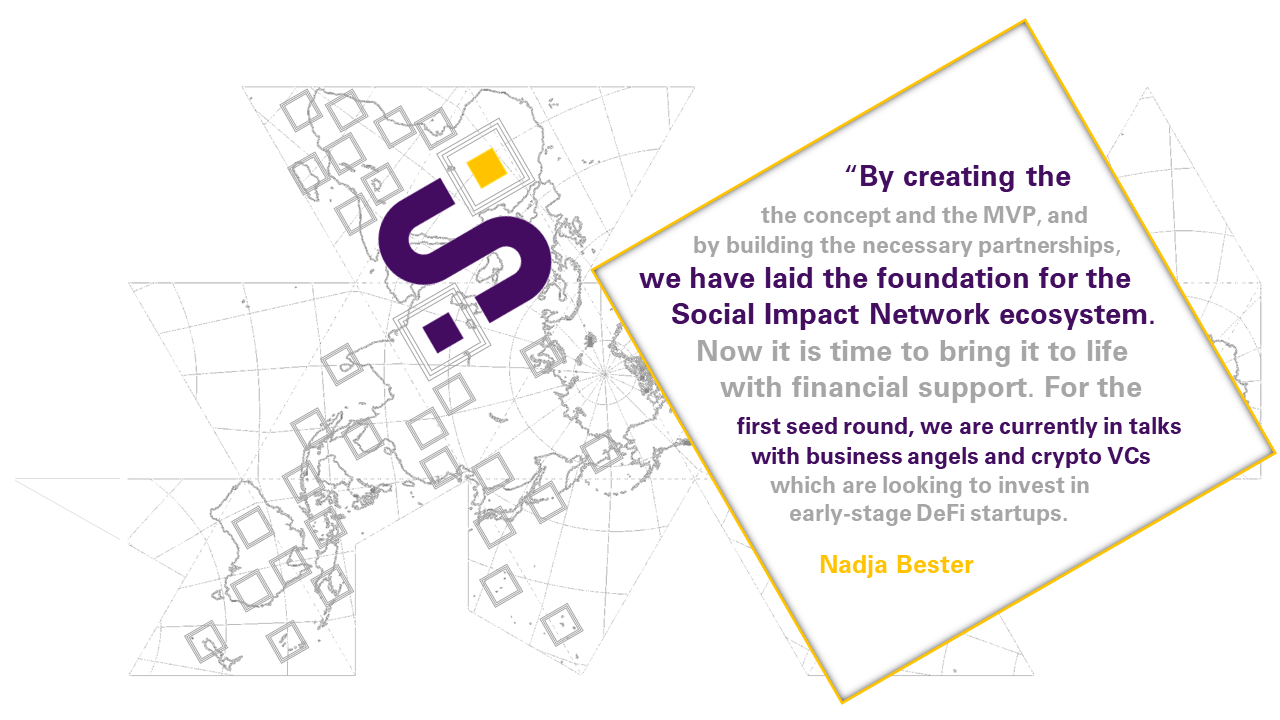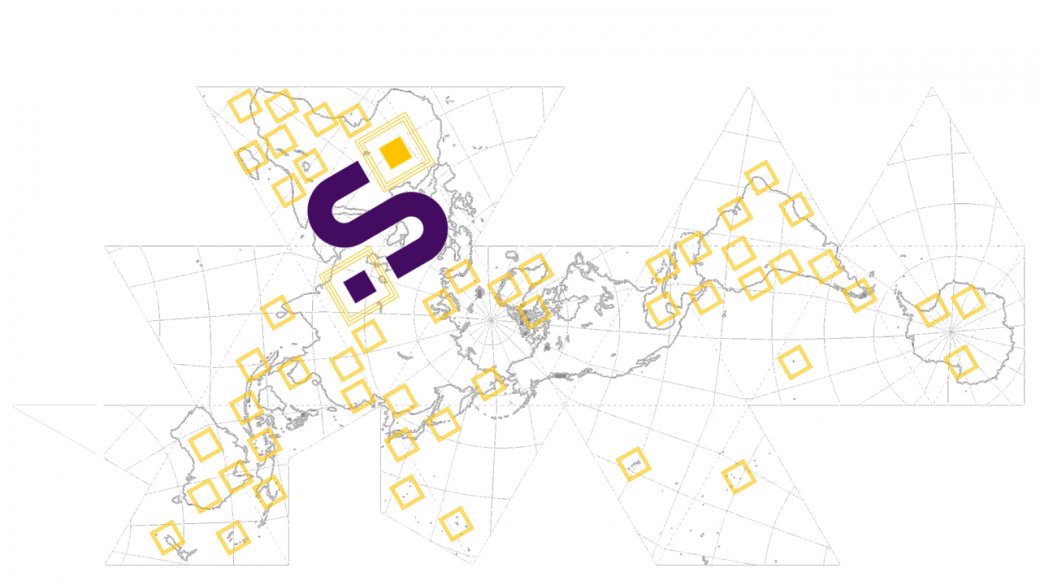“Social Impact Network has identified a way to inject liquidity into Least Developed Countries by creating a new breed of impact investors. Social Impact Network leverages the rapid growth of Decentralized Finance (DeFi), a market valued at $100B. By using blockchain, the ecosystem addresses many of the challenges faced by the traditional impact investing sector, which over time will serve to introduce DeFi to a whole new cohort of investors,” says Nadja Bester.
Nadja Bester heads up marketing and communications at Social Impact Network and is responsible for Social Impact Network’s brand, marketing and communication strategy during its go-to-market phase. You are welcome to contact Nadja Bester with your possible investment opportunity to build out the Social Impact Network venture here.
Sebastian Klemm: Why is your Social Impact Network an effective platform for impact investing? What challenge does it respond to?
Nadja Bester: To understand what challenge we are addressing, let me first sketch the broader landscape Social Impact Network finds itself in.
If the $106T equity market is anything to go by, investing is a popular sport. If you are in the investment game, you know it is not liquidity that is an issue, but access. At the same time, it is impossible to ignore the fact that while there is enough money in the global economy that we’re able to send billionaires to the moon, there are billions of people the world over who are still lacking access to basic human rights. Electricity, for example, is for most of us a given, yet one look at the targets the Sustainable Development Goals (SDGs) are addressing will tell you that inequalities between nations and communities are some of the most pressing issues that the world is not addressing fast enough. The fact that there is a $7T annual deficit in meeting the SDGs by 2030 is alarming, especially now that Covid-19 has dethroned the growing focus on climate change mitigation as a top priority.
There is a solution in the form of impact investment. Impact investing is a way to ensure that investing extends beyond the realm of profit purely for its own sake. Impact investors can double-dip their investments: Not only do they receive gains on their capital, but their investments are used to make a difference in the realm of ESG (Environment, Social, and Governance). However, the $715B impact investing sector faces its own challenges, which ranges from a lack of flexibility and transparency at the individual level, to the fact that investments in developed markets are considered a much safer bet. As a result, impact projects tend to proliferate in countries that can already afford to implement such measures, and markets where there is already a serious lack – such as least-developed countries (LDCs) – continue to be last in line.
Social Impact Network has identified a way to inject liquidity into LDCs by creating a new breed of impact investors. Social Impact Network leverages the rapid growth of Decentralized Finance (DeFi), a market valued at $100B. By using blockchain, the ecosystem addresses many of the challenges faced by the traditional impact investing sector, which over time will serve to introduce DeFi to a whole new cohort of investors. But, more immediately, it adds to crypto investor portfolios a new dimension: The ability to invest in hard-asset projects that provide measurable impact, and since the process is largely automated, becoming an impact investor requires no more effort than what someone already does to maintain their current DeFi investments.

Sebastian Klemm: What concrete benefits of Decentralized Finance do you leverage to fill the gaps of traditional impact investment?
Nadja Bester: The best way to think about DeFi is as a ‘Crypto Wall Street’. If Bitcoin is a decentralised digital alternative to the dollar, then DeFi is the decentralised version of every financial instrument currently being offered by service providers such as banks and insurers. DeFi is one of the newest kids on the block as far as DLT use cases go, and the talk of it being an alternative finance ecosystem is the realisation of what people have been promising for years in terms of how blockchain and cryptocurrency will transform the financial industry. But DeFi is still in its infancy and while there are a lot of innovations taking place in the space, I reckon we have not seen more than initial flutterings of how it will mature.
DeFi has only been around since 2017, though it was not until 2020 that it scaled and took off as exponentially as it did. As something so new and still considered cutting-edge even by people in blockchain, it is already valued at roughly $100B, which tells us that this is the start of big things to come. After all, we need only to look at cryptocurrency to understand that new ideas inevitably follow a diffusion of innovation, with early adopters ringing in “crazy” ideas that laggards later come to regret for not having jumped on the bandwagon sooner.
So how does this relate to impact investing?
The SDG funding gap is most noticeable in LDC markets where, due to a variety of factors, impact investors have less of an incentive to lock themselves into an investment. This is, after all, a key challenge with some of the impact investing asset vehicles, where pooling your stake into an impact crowdfunding platform means your funds are locked for up to a decade or longer. This is the case with solar PV projects, for instance. So the liquidity that needs to flow into these markets – in the form of investment rather than aid – is lacking. This is one of many challenges that impact investing needs to address if it is to have the financial reach which the world so desperately needs to help transform big issues. Blockchain technology in general, and DeFi protocols specifically, by its very design, are natural solutions to some of these problems.
At the same time, DeFi portfolios – like crypto portfolios in general – are largely digital and while the cryptoverse is expanding, thus far it has had a limited influence on the physical world. By bridging these two industries, Social Impact Network enables DeFi investors to expand their portfolios to real-world assets. Additionally, DeFi natives are hungry for more sustainable use cases that are about more than just high profits, yet do not require them to sacrifice the returns they are used to in the space.
That is the gap Social Impact Network is filling.
Sebastian Klemm: Who are first stakeholders and projects on your platform? What roles are installed to validate projects when onboarding them as well as to account & report a project’s implementation and impact?
Nadja Bester: Social Impact Network originated as a response to a challenge set by the United Nations Development Programme’s Alternative Finance Lab, during the DLT4EU programme in 2020. The idea was to incentivise civic participation with digital currency to stimulate impact investment.
So the ecosystem has been purpose-built from the onset to accommodate impact investors (lenders) and impact project executioners (borrowers). Out of a pilot programme with UNDP Lebanon during 2020 came a partnership with UNDP as an impact partner, and these and other international aid organisations and expert organisations will provide services such as conducting due diligence, overseeing project implementation, and validating impact reporting.

Sebastian Klemm: What investment opportunities are you currently seeking, in order to build out your venture of the Social Impact Network?
Nadja Bester: By creating the concept and the MVP, and by building the necessary partnerships, we have laid the foundation for the Social Impact Network ecosystem. Now it is time to bring it to life with financial support. Since Social Impact Network will be a decentralized ecosystem, we will go the token sales funding route. This buy-in will also translate to governance, as the entire ecosystem will be governed by token holders. A portion of the tokens will be sold in different sales rounds (seed, community, and public) at a fixed price to cover the costs of launching the project (development, human resources, marketing, and legal). A portion of the tokens will remain in the treasury as a reserve to cover the medium to long-term operational costs of the ecosystem.
For the first seed round, we are currently in talks with business angels and crypto VCs which are looking to invest in early-stage DeFi / Crypto startups.
Sebastian Klemm: What is the best way for interested parties who want to invest in your immediate Social Impact Network venture building to contact you?
Nadja Bester: Of course, this depends primarily on the phase during which you wish to invest. Angels or Crypto/DeFi VCs interested in the early phase of the project can contact co-founder Cedric Lehmann (cedric@social-impact.network) for more information about seed sale token acquisition.
If you are interested in the upcoming community or public sale rounds, you can register on our website to receive further information in due time.

Direct Contact for Seed Sale Token Acquisition
Register for Public Sale Rounds on the Social Impact Network Website






